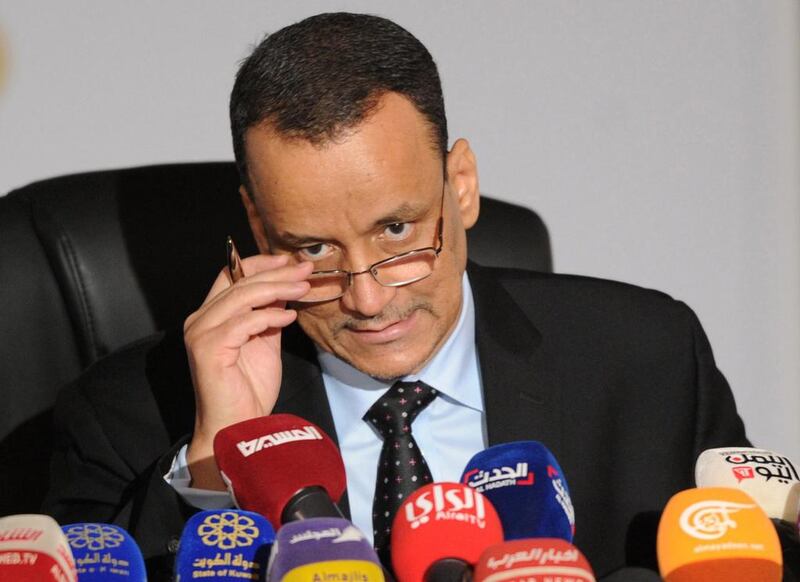Aden // Houthi rebels and their allies named a 10-man council to run Yemen on Saturday, further jeopardising prospects for peace as the UN called a halt to more than three months of talks that failed to achieve any breakthrough.
Announcing the suspension of negotiations in Kuwait City, the UN special envoy to Yemen Ismail Cheikh Ahmed condemned the “unilateral step” by the rebels and said it was not in the interests of Yemen or the peace process.
Mr Cheikh Ahmed said he would continue to consult both sides to arrange further negotiations.
“We will be leaving Kuwait today but the Yemeni peace talks are continuing,” he said.
“We have guarantees and commitments from the two sides that they are ready to return to the negotiating table.”
He said a new round of talks could begin in a month’s time.
Mr Cheikh Ahmed’s announcement of the break in negotiations came as pro-government forces recaptured key areas east of Yemen’s capital.
The Iran-backed Houthis overran Sanaa in late 2014 before moving into other parts of Yemen, prompting a Saudi-led military coalition to intervene in March last year in support of president Abdrabu Mansur Hadi.
The Yemeni army said its troops and fighters from the popular resistance, backed by coalition air strikes, launched a military operation in Nihm district in response to rebel violations of a UN ceasefire that took effect before the peace talks in Kuwait began on April 21.
Pro-government forces liberated Al Hawl village, Al Qanaseen hill, Al Manara mountain and other areas in Nihm, the army said on its Facebook page.
Fierce fighting was continuing, with 23 Houthis killed and dozens injured, and 12 fighters killed and 25 injured on the government side, according to Saleh Al Qubaiti, a journalist in the area.
The pro-government forces advanced into Nihm from Marib province to the west. Coalition troops helped to liberate Marib’s capital last year and are stationed in the province, but they are not taking part in the battle for Sanaa.
Mohammed Al Gadasi, a journalist based in Marib, said government forces held the advantage after capturing Al Manara mountain as it commands the centre of Nihm district.
“The control of Al Manara mountain is a major development that will lead to the liberation of Nihm,” he said.
With government forces now just 10 kilometres from Sanaa’s airport, the army also called on residents of the capital to stay away from Houthi headquarters and camps and not to allow the rebels to use their homes as firing positions.
Pro-government forces also made gains in the northern province of Al Jawf, which borders the Houthi stronghold of Saada province, capturing the police headquarters in Al Ghail and areas north of the district, said Abdullah Al Ashraf, a spokesman for the popular resistance.
Meanwhile, the positions on the rebels’ 10-member “supreme political council” were divided equally between Houthis and loyalists of their ally, former president Ali Abdullah Saleh, according to a list released by the Houthi-controlled Saba news agency. It includes Saleh Al Sammad, head of the Houthis’ political wing Ansarullah and a former adviser to president Hadi, and Sadek Abu Ras, deputy head of the General People’s Congress, Mr Saleh’s party.
Mr Al Sammad was named as president, with the position to alternate between the two sides, Saba said.
The council also includes sheikh Sultan Al Samei, a member of the Yemeni Socialist Party from Taez, where government and rebel forces have been waging fierce battles for control since last year.
The rebels announced plans to form the council on July 28, shortly before rejecting a UN peace plan because it did not meet their key demand for a unity government. That condition amounts to an explicit call for the removal of Mr Hadi, the internationally recognised president.
Mr Hadi’s government on Saturday accused officials at the Yemen central bank of using public funds held overseas to help the rebels and asked international financial institutions to cut off access.
Prime minister Ahmed bin Daghr received “confirmed information” that the officials were tapping foreign reserves held at banks in Europe and the United States after exhausting funds in Sanaa and elsewhere for the war effort, an official at the PM’s office told the government sabanew.net news agency.
“Out of concern for the funds and belongings of the Yemeni people, and in order to preserve the remaining public funds ... the Yemeni government has decided to take this step, which includes suspending dealing with central bank governor Mohammed Awad bin Humam,” the official said.
The government has accused the Houthis of squandering some $4 billion (Dh14.7bn) in reserves held by the central bank on their war effort, and a UN report last week said the Houthis had diverted about $100 million a month from the bank to pay their fighters, with foreign reserves dropping to $1.3 billion in June from $4.6bn in November 2014.
The Houthis claim the funds were used to finance imports of food and medicine.
World powers are concerned about the humanitarian situation in Yemen, where the United Nations says many provinces are on the verge of famine. More than 6,400 people have been killed since March last year and some 2.5 million have been displaced.
foreign.desk@thenational.ae
* With reporting from Agence France-Presse





